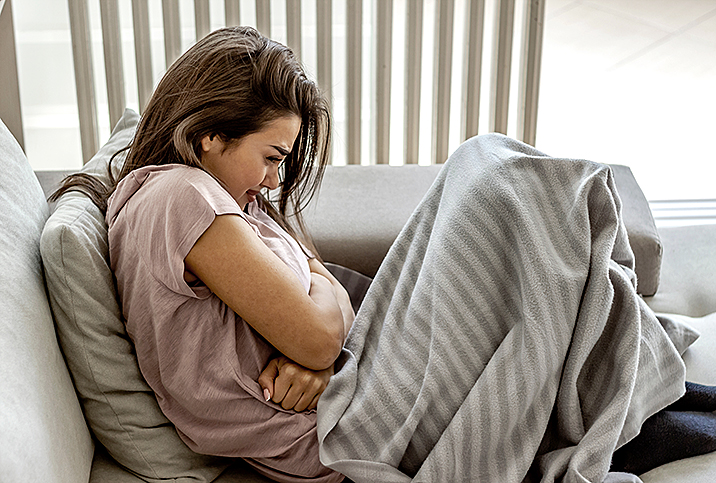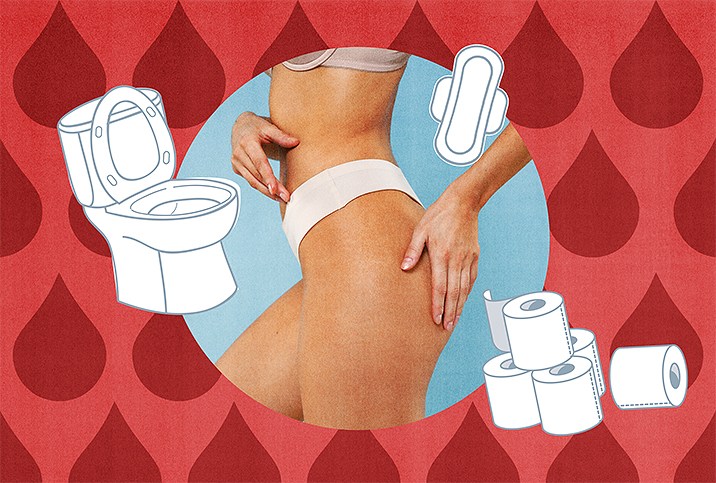8 Signs Your Period Is Coming

Approximately 90 percent of women experience some level of physical and mental changes, including mood swings, before their period. You might also experience changes in your symptoms over the years.
Stress can significantly affect your period. Stress-induced hormone changes might increase these telltale signs, alter the length of your cycle or even cause your period to stop. A National Institutes of Health (NIH) study found an association between stress and the severity of premenstrual syndrome (PMS) symptoms.
PMS is most likely to affect women in their 30s, and it gets worse with age as women transition into perimenopause, according to the U.S. Department of Health & Human Services.
We talked to OB-GYNs about the most common symptoms women experience before their period arrives. You might not even interpret some of these signs as ways of getting your body ready for menstruation.
Physical changes and mood swings can present up to two weeks before the start of a period and usually subside three to four days after menstruation begins, said Zahra Ameen, M.B.B.S., a consultant OB-GYN at Cadogan Clinic, headquartered in London.
"Signs and symptoms preceding the onset of the period are caused by hormonal fluctuations, [for example,] a sudden drop in estrogen and progesterone immediately after ovulation, which can reduce the amount of serotonin," she said. "Serotonin is a hormone naturally found in your gut and brain, and in reduced levels is known to cause low mood and some physical symptoms."
The eight most common symptoms of an oncoming period and their causes include the following:
1. Abdominal cramps
Abdominal cramps, or primary dysmenorrhea, are probably the most well-known symptom of PMS. Some women also experience pain radiating to other parts of the body, such as their lower back or upper thighs.
Prostaglandins, a type of chemical released by the uterus, are responsible for abdominal pain, explained Monte Swarup, M.D., a board-certified OB-GYN in Chandler, Arizona, and founder of Vaginal Health Hub.
"Your uterus makes chemicals called prostaglandins, which tighten and relax the uterus muscles," he said.
2. Headache
The drop in estrogen levels can trigger headaches, Swarup noted.
A period, combined contraceptive pills, pregnancy and menopause can all cause hormone headaches, according to the National Health Service (NHS) in the United Kingdom. These "menstrual migraines" tend to be more severe and can develop two days before menstruation or during the first three days of the period and are more likely to return the next day.
3. Constipation or diarrhea
"Your body builds up progesterone before your period, which can slow your digestive system," Swarup said of the cause of constipation.
But the prostaglandins, the fatty acids your uterus produces to help relax its muscles while shedding its lining, have a similar effect on your bowels, resulting in more poop or diarrhea, according to Cleveland Clinic.
4. Bloating
The changes in estrogen and progesterone levels can cause you to retain more salt and water, Swarup explained.
Reducing salt intake, eating more fresh fruits and vegetables, and exercising more can reduce the severity of abdominal bloating and flatulence caused by water retention, Ameen added.
5. Period acne
The previously mentioned drop in progesterone and estrogen levels can also trigger your glands to secrete extra sebum, an oily substance that moisturizes and protects the skin.
"Skin inflammation can also occur by an increase in hormones," Swarup added.
A study on how the menstrual cycle affects acne found 44 percent of participants—177 of 400—experienced premenstrual acne flares. The participants, ages 12 to 52, were questioned whether their acne worsened before, during or after their period. The survey reported that premenstrual flare-up was more common in women older than 33 than in the age group of 20 to 33. There was also no correlation between the flare-up rate and the women's ethnicity, severity of acne or oral contraceptive use.
6. Fatigue
Serotonin, which plays a vital role in mood, sleep and sexual desire, also fluctuates before your period and can cause fatigue, according to Swarup.
"Fatigue and difficulty sleeping, due to an increase in core body temperature, [is] secondary to fluctuations in estrogen and progesterone levels," Ameen added.
7. Mood swings
Mood changes such as feeling low, teary, angry or irritable are widespread psychological symptoms before menstruation starts. Experiencing anxiety and depression during this time isn't uncommon, either.
"The neurotransmitters in your brain, [including] dopamine and serotonin, regulate mood control. Your hormonal levels changing before your period affect your dopamine and serotonin, causing anxiety and depressive feeling," Swarup said.
8. PMS symptoms
While the above symptoms are standard hints that your period is on its way, Ameen listed a couple of PMS symptoms that you might overlook:
- Feeling short of breath, especially during exercise
- Taking longer to recover from an intense exercise session
- A much more severe form of PMS is premenstrual dysphoric disorder (PMDD). Its symptoms include feelings of intense rage, nervousness, lack of control, difficulty concentrating, forgetfulness, poor self-image, headache and muscle spasms.
Overall, keeping up with your health and monitoring how you feel before, during and after your period are essential to maintaining your quality of life.


















